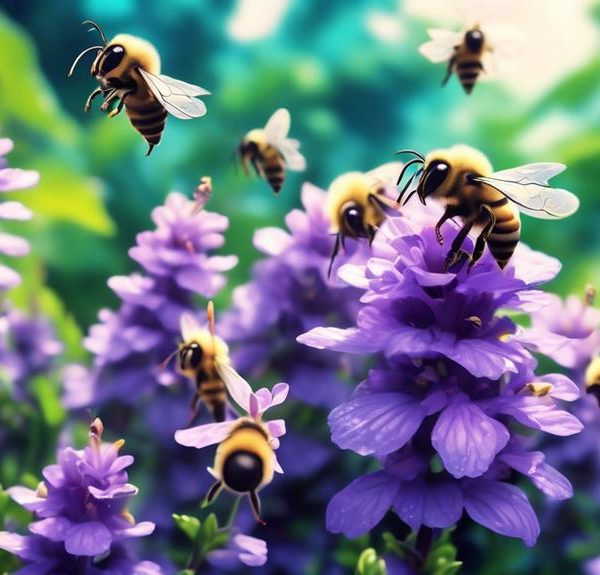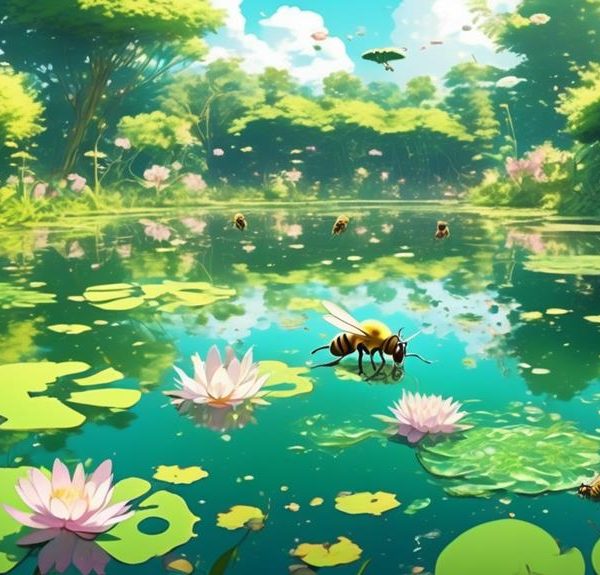Learn about the intriguing, yet complex, relationship between bees and alcohol in this deep dive into their intoxicating attraction.
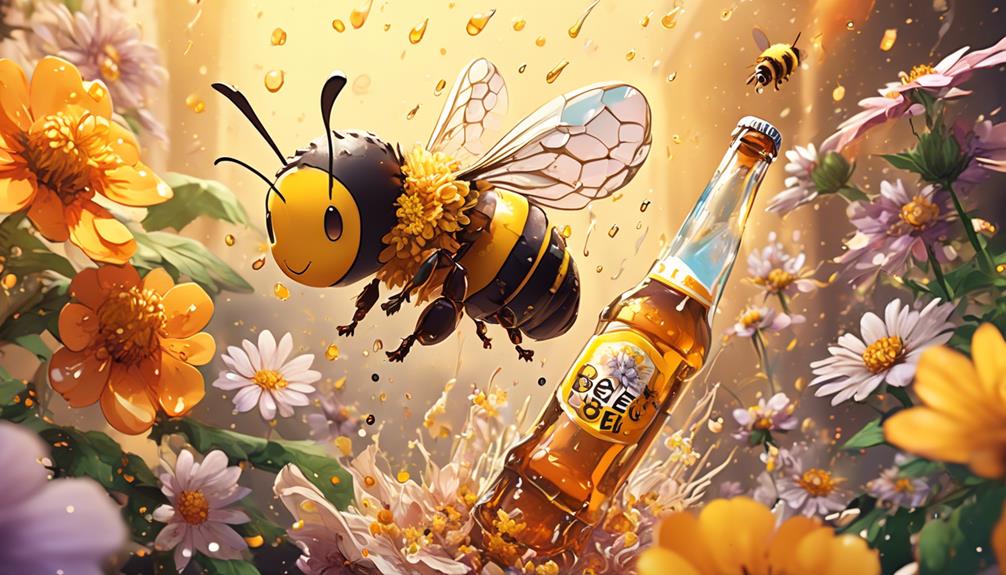
Do Bees Like Alcohol?
Ever wondered about the truth behind the claim that bees harbor a fascination for alcohol? You're not alone. It's a topic that has piqued scientific curiosity, leading to intriguing research and experiments.
Picture this: a bee, buzzing erratically, seemingly drawn to your bottle of sweet, fruity cider – but is it the alcohol that's attracting them or something else entirely?
The answers lie a little deeper in the complex world of bee behavior and their interaction with intoxicating substances. But before you start envisioning drunken bees stumbling in their hives, it's important to understand the nuances involved.
Brace yourself for a journey into the fascinating, and somewhat bewildering, relationship between bees and booze.
Key Takeaways
- Bees exhibit behaviors similar to intoxication when exposed to alcohol.
- Alcohol affects bees' brains, hindering their motor function, learning abilities, and recognition of floral scents.
- Alcohol impairs bees' communication skills, affecting their ability to perform the 'waggle dance'.
- Alcohol disrupts bees' navigation skills, causing them to lose their orientation and potentially impacting pollination rates.
The Curious Link: Bees and Alcohol
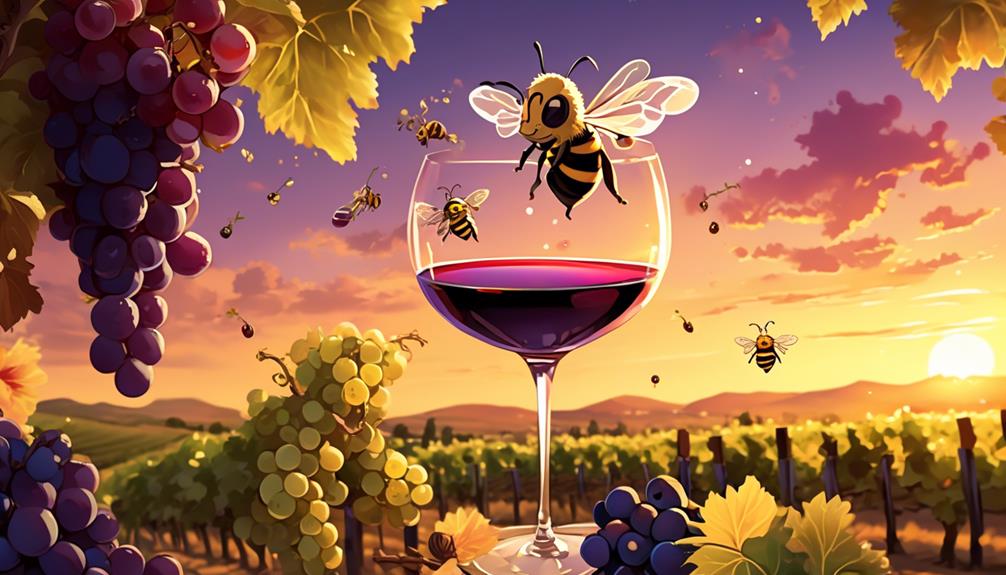
While it might seem strange, bees actually exhibit behaviors similar to intoxication when exposed to alcohol. This curious link is a subject of scientific interest. Like humans, bees can't resist the lure of sweet, fermented fruit. They'll consume it until they're literally buzzing, exhibiting behaviors that mimic drunkenness, like flying erratically and being less responsive to stimuli.
Researchers have found that alcohol affects bees' brains similarly to how it affects human brains. It hinders their motor function and learning abilities. Bees that have consumed alcohol have difficulty performing tasks such as recognizing floral scents, which are crucial for their survival and the pollination of plants.
It also impairs their communication skills, as they're less able to perform the 'waggle dance,' a movement bees use to tell their hive-mates about food sources.
Scientific Studies on Bees' Alcohol Consumption
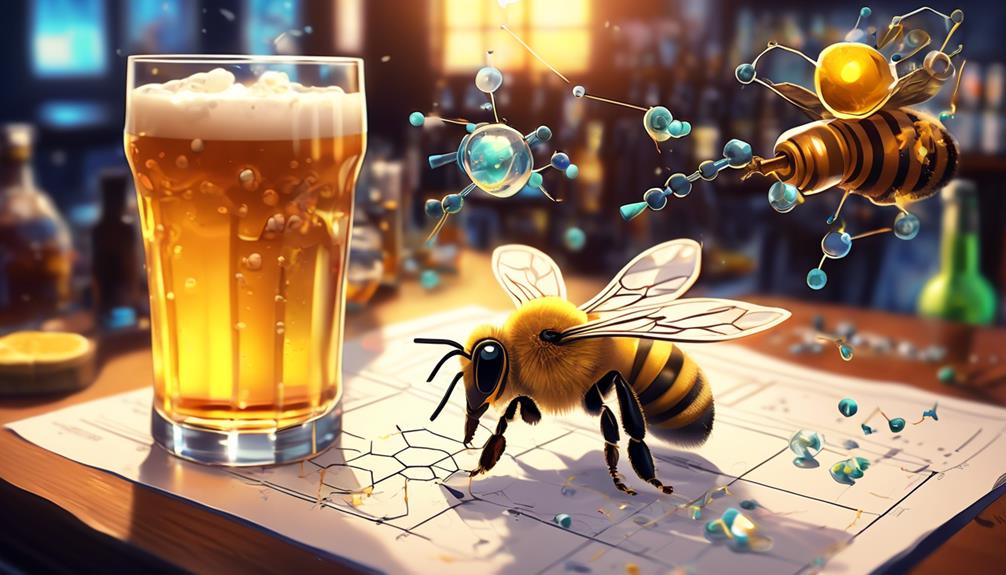
Building on the observed behavioral changes in bees exposed to alcohol, numerous scientific studies have been conducted to unravel the effects and implications on a deeper level. You may be surprised to learn that these studies have discovered some fascinating insights.
One groundbreaking study found that alcohol consumption alters the behavior of bees in a way that's similar to humans. After ingesting alcohol, bees' motor functions deteriorate, they become slower, and their ability to fly and navigate is impaired. This suggests that alcohol might have similar neurological effects on bees as it does on humans.
Research has also shown that bees can develop a tolerance to alcohol over time, much like humans do. This is evidenced by bees' ability to consume larger quantities of alcohol without showing the typical signs of intoxication.
Moreover, studies have indicated that bees can become attracted to alcohol, demonstrating a preference for sugar solutions that contain alcohol. This attraction could potentially be exploited to control bee populations or to study their behavior further.
It's fascinating, isn't it? These studies not only deepen our understanding of bees but also offer intriguing possibilities for future research.
Effects of Alcohol on Bee Behavior
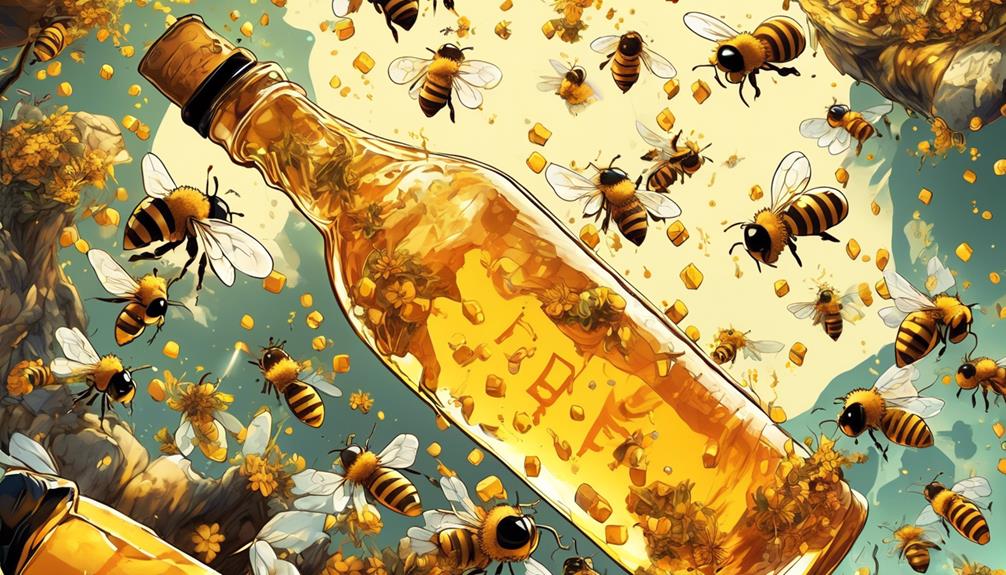
Delving into the effects of alcohol on bee behavior, you'll find that their daily activities and social interactions are significantly impacted. For instance, alcohol consumption impairs their ability to forage effectively. It disrupts their navigation skills, making it difficult for them to return to the hive. This is due to alcohol's effects on the bees' central nervous system, much like it affects humans.
Moreover, bees intoxicated with alcohol exhibit aggressive behavior, often engaging in fights with hive mates. These fights can escalate to the point where the hive's overall health is compromised. Also, their communication system, which relies on intricate 'waggle dances', is hindered. Alcohol affects their capacity to accurately relay information about food sources to their hive mates.
Lastly, alcohol impacts bees' reproduction. Queen bees exposed to alcohol lay fewer eggs, which can lead to a significant reduction in the hive population. Worker bees also show decreased productivity.
Alcohol's Impact on Bee Navigation
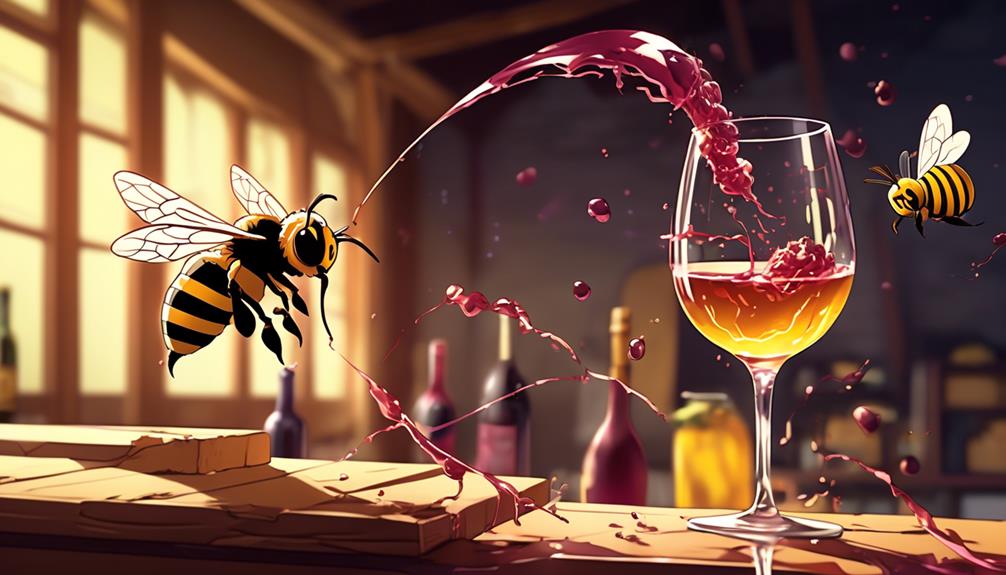
Continuing the exploration of alcohol's effect on bees, let's focus on how it disrupts their navigation skills, a critical aspect of their survival and productivity.
You see, bees rely on a sophisticated internal compass to navigate. This sense of direction is powered by polarized light patterns and the position of the sun. But when bees consume alcohol, their navigational abilities falter.
That's not all. Studies show that even a small amount of alcohol can cause bees to lose their orientation. They start flying erratically, unable to find their way back to the hive. It's like they're seeing the world through a blurred lens, their internal GPS disrupted.
What's more, alcohol impairs their ability to communicate with fellow bees. Normally, bees use a 'waggle dance' to provide directions to food sources. But under the influence of alcohol, this dance becomes distorted, leading to confusion and disarray within the hive.
Potential Consequences for Bee Populations
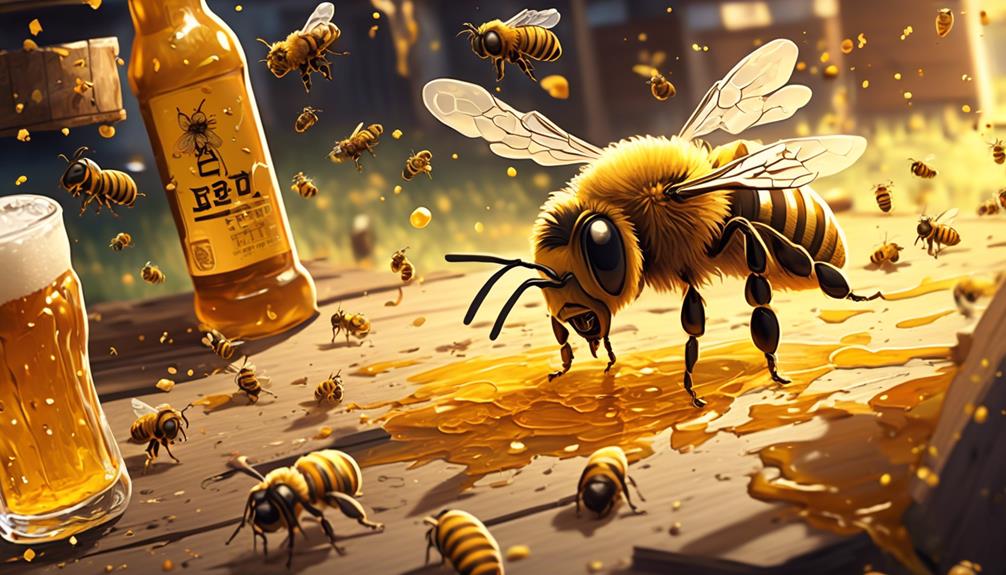
Now, let's examine the potential consequences that alcohol's impairing effects could have on overall bee populations. Bees play a crucial role in pollination, and any behavior-altering substance like alcohol could potentially disrupt this essential task. If bees can't navigate back to their hive due to alcohol impairment, it may lead to a decrease in the bee population and a subsequent decrease in pollination.
Consequence | Explanation |
|---|---|
Decreased Pollination | Bees play a pivotal role in pollination. If alcohol impairs their ability to navigate, pollination rates could decrease. |
Hive Collapse | If a significant number of bees can't return to the hive, it could lead to hive collapse. |
Lowered Reproduction | Impaired bees might be less successful in mating, leading to a decline in bee populations. |
Increased Vulnerability | Inebriated bees may be more susceptible to predators or harsh environmental conditions. |
Disrupted Communication | Alcohol can disrupt the bees' ability to communicate through their complex dance language, impacting hive productivity. |
Understanding these potential consequences is key. It's not just about bees and alcohol. It's about the wider implications for our ecosystems and the numerous species, including us, that depend on bees for survival.
Using This Knowledge: Bee Conservation Efforts
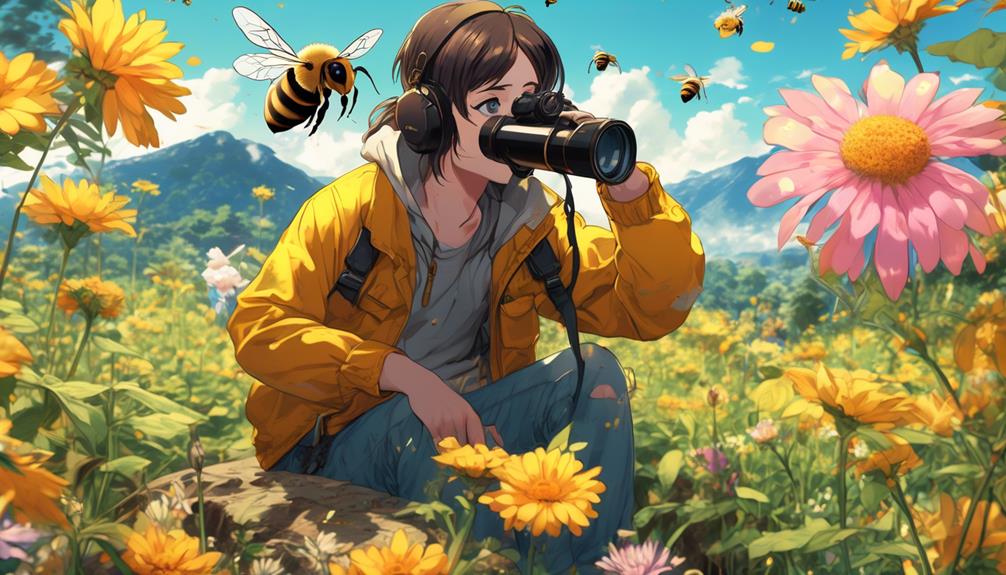
Armed with the understanding of alcohol's potential impact on bees, you can better comprehend why it's vital to consider such factors in bee conservation efforts. Alcohol, even in small amounts, can have a substantial impact on a bee's ability to function, navigate, and communicate. It's a factor that could potentially disrupt entire colonies.
Now, consider the broader implications for bee conservation. Bees are integral to our ecosystems, as they're responsible for pollinating around 70% of the world's crops. The knock-on effect of their decline would be catastrophic. Thus, you must understand the myriad threats they face, including exposure to alcohol.
Perhaps you're thinking, 'But bees aren't downing pints in my local pub!' You're right. However, they can encounter alcohol in their environments, from rotting fruits to human litter. It's crucial to consider all potential hazards when implementing conservation strategies.
You could advocate for increased public awareness, stressing the importance of responsible litter disposal. Or perhaps support research into how bees metabolise alcohol, opening avenues for potential interventions. It's not just about saving the bees; it's about preserving the balance of our ecosystems and, ultimately, our own survival.
Frequently Asked Questions
What Are Some Other Substances That Bees Are Attracted To, Apart From Alcohol?
You might be curious about what bees are drawn to, apart from alcohol. Interestingly, these buzzing creatures gravitate toward sweet substances, especially nectar and pollen from flowers. They're also attracted to water sources and certain scents.
Surprisingly, some bees even show preference for human sweat! Their attraction varies based on species, season, and individual preference. So, it's not just alcohol, there's a whole array of substances that can captivate these tiny pollinators.
How Does Alcohol Consumption Affect the Lifespan of Bees?
When you consider the effect of alcohol on bees, you'll find it shortens their lifespan. Alcohol consumption disrupts their motor functions, making it harder for them to navigate and forage.
It also reduces their ability to fight off diseases. Over time, these effects compound, leading to a decreased lifespan.
Are the Bees Capable of Producing Alcohol Naturally in Their Hives?
No, bees aren't capable of naturally producing alcohol in their hives. Their digestive system doesn't have the necessary fermentation process to create alcohol.
However, they can ingest fermented nectar or fruit, which can contain alcohol.
It's important to note that consuming alcohol can be harmful to bees, affecting their navigation skills and overall health.
Always remember, the well-being of our buzzing friends is crucial for the environment.
Can Bees Get Addicted to Alcohol Over Time?
You're curious if bees can develop an addiction to alcohol over time. Currently, there's no scientific evidence to suggest that bees can become addicted to alcohol.
What Other Insects Have Been Observed to Consume Alcohol?
You might find it surprising, but several insects have been observed consuming alcohol.
Fruit flies are a prime example, often indulging in overripe, fermenting fruit.
Also, certain species of moths and butterflies are attracted to alcoholic substances, specifically those found in rotting fruit and tree sap.
It's not a general rule for all insects, but these few examples certainly show nature's unexpected ways.
Conclusion
So, do bees like alcohol?
Not quite. While they might consume it, the effects are detrimental, impairing their behavior and navigation skills. This can lead to potential consequences for entire bee populations.
Understanding this curious link between bees and alcohol is crucial in our bee conservation efforts.
Let's use this knowledge to ensure these little pollinators continue to buzz around, doing their vital work for our ecosystems.

